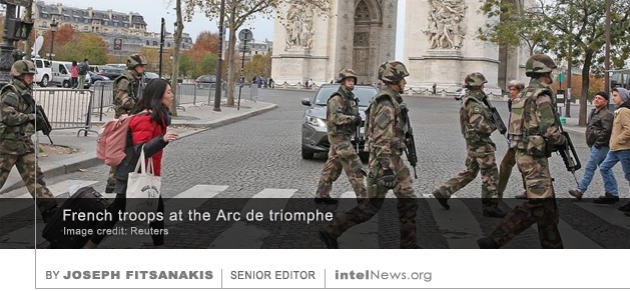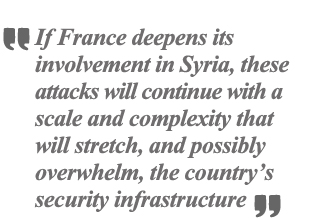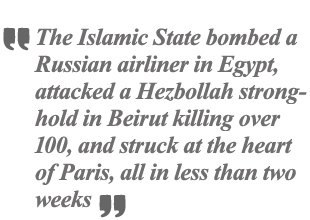Analysis: The West should weigh carefully its response to the Paris carnage
NOVEMBER 14, 2015 4 COMMENTS

Paris is still reeling from Friday’s unprecedented carnage, which left at least 130 people dead and 350 wounded. The six separate incidents included the first known suicide bombings in the country’s history and marked the deadliest coordinated attacks on French soil since World War II. The magnitude of the attacks prompted the French government to close the country’s borders and declare a nationwide state of emergency —the first since 1961. The shock from the mass killings is today reverberating throughout Europe, a continent that had not seen such a deadly incident since the Madrid train bombings of 2004, when a group of al-Qaeda-inspired militants killed 191 people in the Spanish capital. A response from France and its Western allies is to be expected. However, the West should pause and think very carefully before deepening its engagement in a chaotic and unpredictable war that is like nothing it has ever experienced. Specifically, Western leaders should consider the following:
I. The adversaries know and understand the West, its culture and way of life, far better than the West understands them. Ever since 9/11 and the London bombings of 2005, a number of Western observers have cautioned against the so-called “Islamization of Europe”. Nothing could be further from the truth. In reality, the events of 9/11 caused a widening gulf between an increasingly Islamophobic West and Muslims; the latter are viewed by European critics of Islam as foreign bodies. What is far more prevalent and important is the Europeanization of Islam, which means that adherents of radical Islam are studying and interacting with European culture, norms and values, more intensely than ever before. Consequently, armed attacks carried out by Islamist militants against Western targets reflect a deep understanding of Western culture that far exceeds the West’s understanding of them. The November 13 attacks in Paris typify this: they were not “indiscriminate”, as some have suggested. They were carefully selected to achieve core political objectives, while at the same time sending a symbolic message against the Western way of recreation, which Islamists view as decadent. That was highlighted in a statement about the Paris attacks issued by the Islamic State, in which the group singled out the Bataclan Theater as a venue where “a party of perversity” was taking place. Europe’s response to this phenomenon is dismissal and indifference. Most Westerners are still at a loss trying to understand the basic differences between Sunni and Shia Islam, let alone the ideological and spiritual underpinnings of groups like the Islamic State, Jabhat al-Nusra, and others. The idea that radical Islam can be defeated before it is understood is naïve and dangerous.
a venue where “a party of perversity” was taking place. Europe’s response to this phenomenon is dismissal and indifference. Most Westerners are still at a loss trying to understand the basic differences between Sunni and Shia Islam, let alone the ideological and spiritual underpinnings of groups like the Islamic State, Jabhat al-Nusra, and others. The idea that radical Islam can be defeated before it is understood is naïve and dangerous.
 a venue where “a party of perversity” was taking place. Europe’s response to this phenomenon is dismissal and indifference. Most Westerners are still at a loss trying to understand the basic differences between Sunni and Shia Islam, let alone the ideological and spiritual underpinnings of groups like the Islamic State, Jabhat al-Nusra, and others. The idea that radical Islam can be defeated before it is understood is naïve and dangerous.
a venue where “a party of perversity” was taking place. Europe’s response to this phenomenon is dismissal and indifference. Most Westerners are still at a loss trying to understand the basic differences between Sunni and Shia Islam, let alone the ideological and spiritual underpinnings of groups like the Islamic State, Jabhat al-Nusra, and others. The idea that radical Islam can be defeated before it is understood is naïve and dangerous.
II. The West does not have the intelligence and security infrastructure that is necessary to take on the Islamic State. It should not be forgotten that last Friday’s attacks took place despite the state of heightened alert that France has been under after the Charlie Hebdo shootings of January 2015. Since that time, French authorities have reportedly managed to stop at least six advanced plots against civilian targets, while alert passengers were able to prevent a mass shooting aboard a French train in August of this year. However, if France deepens its involvement in the Syrian Civil War, these attacks will continue with a scale and complexity that is bound to stretch —and possibly overwhelm— the country’s security infrastructure. Nine months after the Charlie Hebdo shootings, the presence of thousands of police officers and even troops in the streets of Paris has become common. But that did nothing to stop Friday’s attacks in a city of 2.2 million people, which features 35,000 cafés, 13,000 restaurants and over 2,000 hotels. The sheer number of these “soft targets” makes Paris a city that is virtually impossible to defend against determined suicide assailants. The French are also used to traveling with ease within their country and across Europe, as the borders between France and its neighbors, such as Belgium, Germany and Switzerland, have become practically meaningless. Moreover, French authorities estimate that at least 13,000 radicalized Muslims live in France —a fraction of the country’s nearly 6 million Muslim citizens, but large enough to overwhelm the French security services. In these conditions, heightened levels of surveillance are to be expected. But surveillance alone is meaningless without a radical overhaul of the French —nay, European— intelligence services that will allow for the quick and efficient sharing of actionable information that will stop terrorist attacks before they are carried out. Attempting to stop these attacks after they begin is immensely difficult, especially when their perpetrators are prepared to die.
III. The Islamic State is resource-rich, has advanced planning capabilities and is more operationally sophisticated than any other Islamist group the West has ever faced. It is believed that at least eight militants were involved in Friday’s attacks. This number almost certainly represents the tip of the iceberg in what must have been a sizable group of planners. These individuals became radicalized, established contacts with each other, planned the operation, trained together, and were supplied with weapons and explosives, without nobody in the French intelligence and security services noticing. The fact that such a logistically complex attack was successfully organized and carried out in the post-Charlie Hebdo operational environment is shocking. It also points to the advanced planning capabilities and operational sophistication of the Islamic State, whose geographical territory in the Middle East is bigger than all of France and Britain combined. It currently appears that Islamic State planners were able to bomb a Russian airliner in Egypt, attack a Hezbollah stronghold in southern Beirut killing over 100 people, and strike at the heart of Paris, all in less than two weeks. These are not simple operations, nor are they cheap. But the Islamic State’s resources are virtually unlimited, and this is something that sets it apart from any other Islamist organization the West has ever faced.
 IV. There is more of this to come. The French government’s response to Friday’s attacks was to declare a state of national emergency and close the borders. This goes some way toward calming and reassuring the French population, but has little effect on establishing real security, or combating the Islamic State. Each time the latter attacks targets outside its territory, it makes sure to mobilize members or sympathizers who are willing to die for their cause, thus rendering traditional military- based security measures meaningless. The only way to successfully stop these attacks is to penetrate the Islamic State’s planning cells, which are typically leaderless and know better than to utilize the cell phone grid. This cannot be done overnight and will take collaborative efforts between intelligence agencies in Europe, Russia, America, and the Middle East. Until that happens, more attacks will strike Western “soft targets”. Meanwhile, the cohesion of the European Union is disintegrating before our eyes, while the French far right Front National appears set to win the local elections in France in three weeks’ time, a development that is bound to further marginalize and anger France’s Muslim community.
IV. There is more of this to come. The French government’s response to Friday’s attacks was to declare a state of national emergency and close the borders. This goes some way toward calming and reassuring the French population, but has little effect on establishing real security, or combating the Islamic State. Each time the latter attacks targets outside its territory, it makes sure to mobilize members or sympathizers who are willing to die for their cause, thus rendering traditional military- based security measures meaningless. The only way to successfully stop these attacks is to penetrate the Islamic State’s planning cells, which are typically leaderless and know better than to utilize the cell phone grid. This cannot be done overnight and will take collaborative efforts between intelligence agencies in Europe, Russia, America, and the Middle East. Until that happens, more attacks will strike Western “soft targets”. Meanwhile, the cohesion of the European Union is disintegrating before our eyes, while the French far right Front National appears set to win the local elections in France in three weeks’ time, a development that is bound to further marginalize and anger France’s Muslim community.
Perhaps, therefore, before vowing to crush the Islamic State and destroy Islamist militancy once and for all, the West should be trying to ensure that the upcoming United Nations Climate Change Conference, known as COP 21, which is to take place in Paris in two weeks’ time, is secure. COP 21 is scheduled to be attended by over 80 heads of state, including US President Barack Obama and Russian President Vladimir Putin. One can only hope that these and other powerful individuals can use that opportunity to begin a genuine collaboration aimed at addressing the common challenge of the Islamic State. After all, it was their recklessness and foolishness that permitted the Islamic State to emerge in the first place.
No comments:
Post a Comment